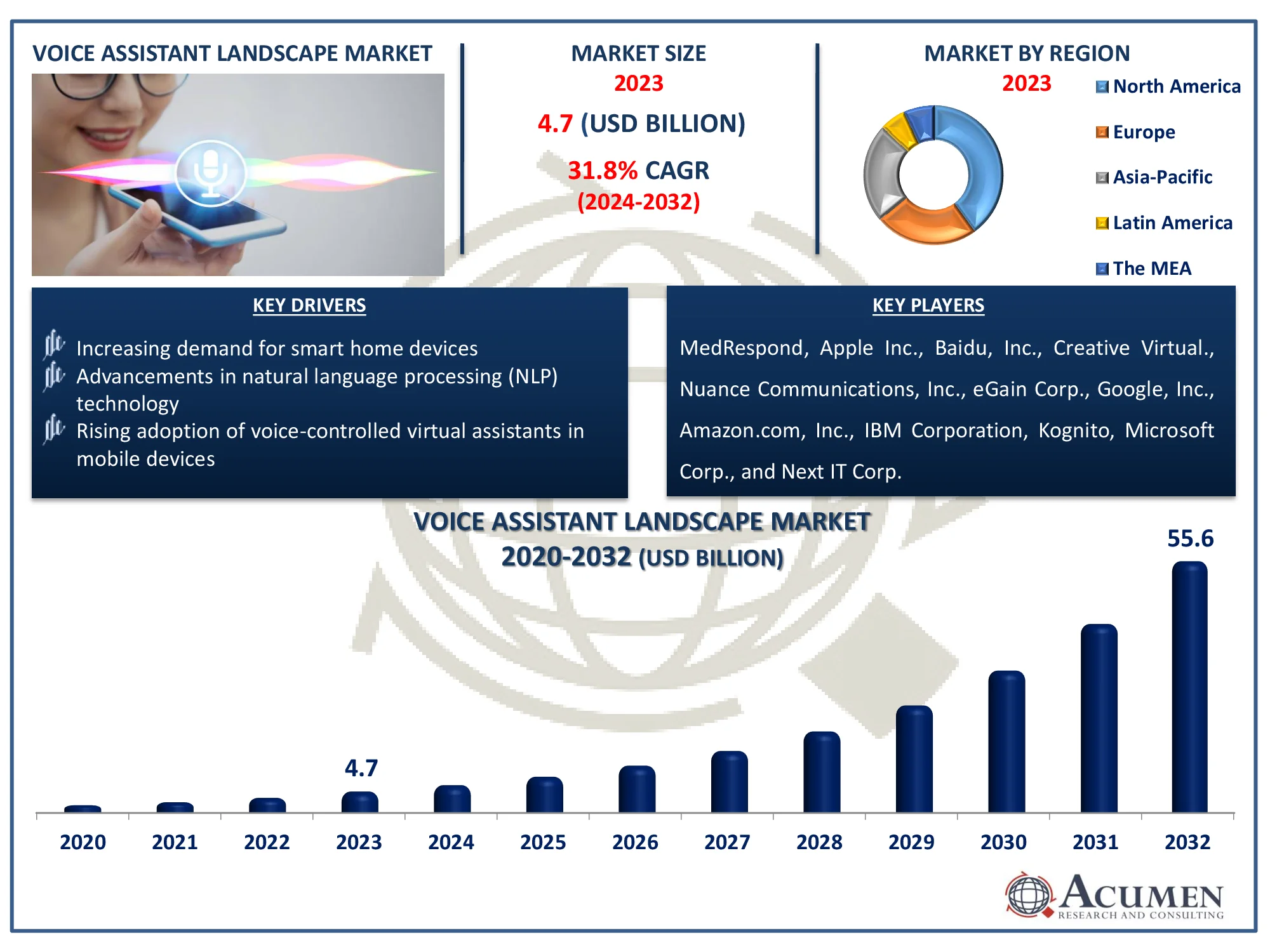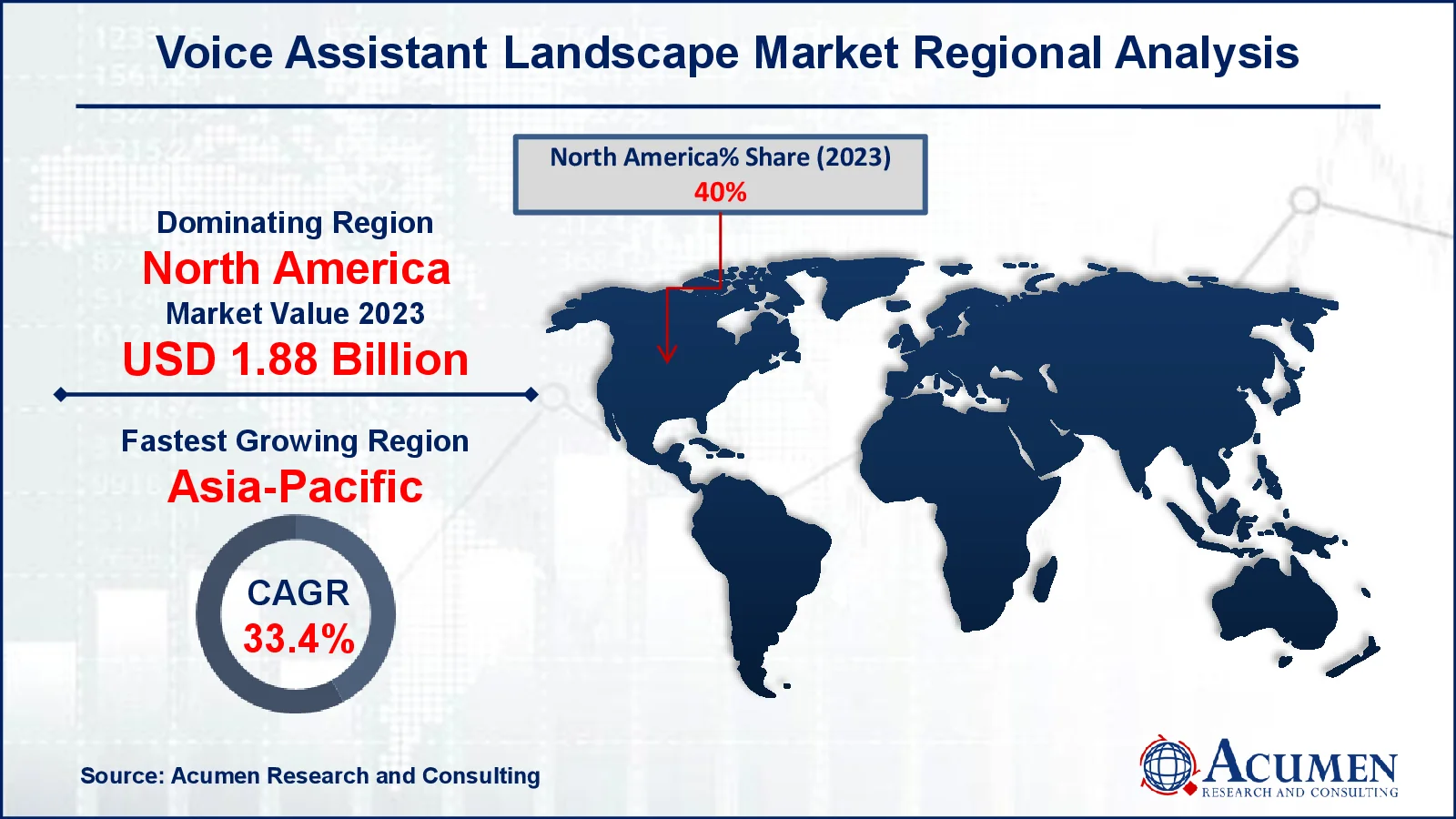August 2022
The Global Voice Assistant Landscape Market Size accounted for USD 4.7 Billion in 2023 and is estimated to achieve a market size of USD 55.6 Billion by 2032 growing at a CAGR of 31.8% from 2024 to 2032.
The Global Voice Assistant Landscape Market Size accounted for USD 4.7 Billion in 2023 and is estimated to achieve a market size of USD 55.6 Billion by 2032 growing at a CAGR of 31.8% from 2024 to 2032.

Voice assistants represent the most recent advancement in personal digital help, ushering in a voice-enabled revolution. These software agents use voice instructions to accomplish activities or provide services. Voice assistants are now vital tools for consumer-device interactions, with prominent options such as Siri, Alexa, Google Assistant, and Microsoft Cortana in widespread use. They provide an easy-to-use experience, particularly on smartphones, and are primarily preferred by younger people globally.
|
Market |
Voice Assistant Landscape Market |
|
Voice Assistant Landscape Market Size 2023 |
USD 4.7 Billion |
|
Voice Assistant Landscape Market Forecast 2032 |
USD 55.6 Billion |
|
Voice Assistant Landscape Market CAGR During 2024 - 2032 |
31.8% |
|
Voice Assistant Landscape Market Analysis Period |
2020 - 2032 |
|
Voice Assistant Landscape Market Base Year |
2023 |
|
Voice Assistant Landscape Market Forecast Data |
2024 - 2032 |
|
Segments Covered |
By Component, By Product, By Technology, By Application, By End-User, and By Geography |
|
Regional Scope |
North America, Europe, Asia Pacific, Latin America, and Middle East & Africa |
|
Key Companies Profiled |
MedRespond, Apple Inc., Baidu, Inc., Creative Virtual., eGain Corp., Nuance Communications, Inc., Google, Inc., Amazon.com, Inc., IBM Corporation, Kognito, Microsoft Corp., and Next IT Corp. |
|
Report Coverage |
Market Trends, Drivers, Restraints, Competitive Analysis, Player Profiling, Covid-19 Analysis, Regulation Analysis |
Beyond smartphones, voice assistant technology is being integrated into industries such as healthcare, education, IT, telecommunications, and automation, allowing for seamless contact with patients, students, consumers, and other users. While voice assistants are gaining popularity, particularly among well-known brands such as Apple, Samsung, Google, and Microsoft, there is still significant resistance to their broad use. For example, according to the Public Interest Research Group (PIRG), Amazon has officially sold over 500 million Alexa-enabled devices worldwide, including over 71 million Amazon smart speakers in the United States. Although these technologies are relatively new, they have yet to gain widespread voice assistant application market adoption and realize their full potential, particularly among younger audiences.
Currently, a lack of awareness is hampering their progress. However, in the future, voice assistants are predicted to transform user interactions, making them more convenient and widely used around the world. Furthermore, increasing usage of smart home devices drives voice assistant market growth. Key players contribute to its growth by introducing new technologies and technology, which in turn encourages the growth of products such as voice assistants. For example, in September 2022, Amazon added four new or updated smart speakers to its lineup: the Echo Auto, Echo Studio, Echo Dot, and Echo Dot with Clock. The Echo Dot and Echo Dot with Clock include updated audio architecture, including a full-range driver and the highest excursion speaker ever seen in an Echo Dot. The flagship Echo Studio has garnered numerous audio. The Echo Auto, which focuses on delivering smart speaker features to automobiles, has been made more compact.
According to the India Meteorological Department (IMD), the internet of things (IoT), also known as the ecosystem of linked gadgets, is more than just a future notion. In 2022, 871 million smart home gadgets were supplied globally, with the total expected to rise to 1.23 billion by 2027. As a result, this integration with internet of things (IoT) devices opens up new opportunities for the voice assistant market.
 Voice Assistant Landscape Market Segmentation
Voice Assistant Landscape Market SegmentationThe worldwide market for voice assistant landscape is split based on component, product, type, application, end-user, and geography.
According to voice assistant landscape industry analysis, solutions component is projected to dominate as consumers want more personalized, efficient, and AI-powered functions. Enterprises are implementing industry-specific speech AI solutions in healthcare, retail, finance, and customer service to provide greater accuracy and better experiences. As natural language processing (NLP) and machine learning technologies progress, voice assistant solutions will evolve into intelligent ecosystems, driving innovation and market dominance.
The smart speaker market is predicted to expand voice assistant application market due to broad acceptance in homes and enterprises. With advances in AI and IoT integration, smart speakers are moving beyond basic requests to become major centers for home automation, entertainment, and virtual support. Their ability to accommodate many programs, hands-free comfort, and seamless connectivity with other devices make them a popular choice for users. Meanwhile, the chatbot market expands, notably in customer service and enterprise applications, where text-based AI-powered assistants improve productivity and engagement.
In the voice assistant landscape market, natural language processing (NLP) involves advanced comprehension, context awareness, and seamless human-like interactions. NLP improves the effectiveness of voice assistants by interpreting user intent, evaluating sentiment, and offering accurate responses, making it indispensable for tailored experiences. Meanwhile, speech recognition ensures that spoken words are accurately converted into text, text-to-speech recognition improves accessibility by converting text into natural-sounding speech, and voice recognition provides security and personalization by identifying individual users based on vocal characteristics.
Historically, smart devices are predicted to increase significantly in voice assistant application market since they cover a wide range of applications, such as smart speakers, home automation systems, wearables, and IoT-enabled products. As technology advances, smart gadgets' capabilities will expand, increasing convenience, efficiency, and user engagement. Meanwhile, mobile apps improve the user experience on smartphones and tablets, while web apps offer AI-powered voice help for customer care and online interactions.
In the voice assistant landscape market forecast, IT and telecom are likely to dominate as businesses progressively integrate AI-powered speech solutions for customer support, automation, and better user experiences. With the rise of virtual assistants in technical assistance, network management, and service automation, the IT and telecom industries are at the forefront of acceptance and innovation. Meanwhile, BFSI (banking, financial services, and insurance) uses voice assistants for secure transactions and customer inquiries; automotive improves in-car voice controls for hands-free navigation; healthcare incorporates voice AI for patient engagement and diagnostics; and education uses it for interactive learning.
North America
Europe
Asia-Pacific
Latin America
The Middle East & Africa
 Voice Assistant Landscape Market Regional Analysis
Voice Assistant Landscape Market Regional AnalysisNorth America has long led the voice assistant landscape market, with to the presence of major tech titans such as Amazon, Google, Apple, and Microsoft. The widespread adoption of smart speakers, mobile assistants, and enterprise AI solutions has spurred rapid industry expansion. For example, according to our analysis, the global smart home speaker market is predicted to increase at a 20% CAGR between 2021 and 2028. During this time period, the market is predicted to expand by USD 30 billion. Strong investments in AI, machine learning, and IoT improve voice assistant functionality, making it more intuitive and adaptable.
Asia-Pacific is seeing rapid expansion in the voice assistant market. Countries such as China, Japan, and South Korea are at the forefront of AI innovation, with Baidu, Alibaba, and Samsung investing extensively in voice technology. According to the India Brand Equity Foundation (IBEF), more than 77% of Indian startups are investing in technologies such as artificial intelligence (AI), machine learning (ML), the internet of things (IoT), and blockchain. Furthermore, rising smartphone penetration and smart device use have boosted voice assistant application market expansion in the Asian area.
Some of the top voice assistant landscape companies offered in our report includes MedRespond, Apple Inc., Baidu, Inc., Creative Virtual., eGain Corp., Nuance Communications, Inc., Google, Inc., Amazon.com, Inc., IBM Corporation, Kognito, Microsoft Corp., and Next IT Corp.
Looking for discounts, bulk pricing, or custom solutions? Contact us today at sales@acumenresearchandconsulting.com
August 2022
April 2021
November 2018
September 2024